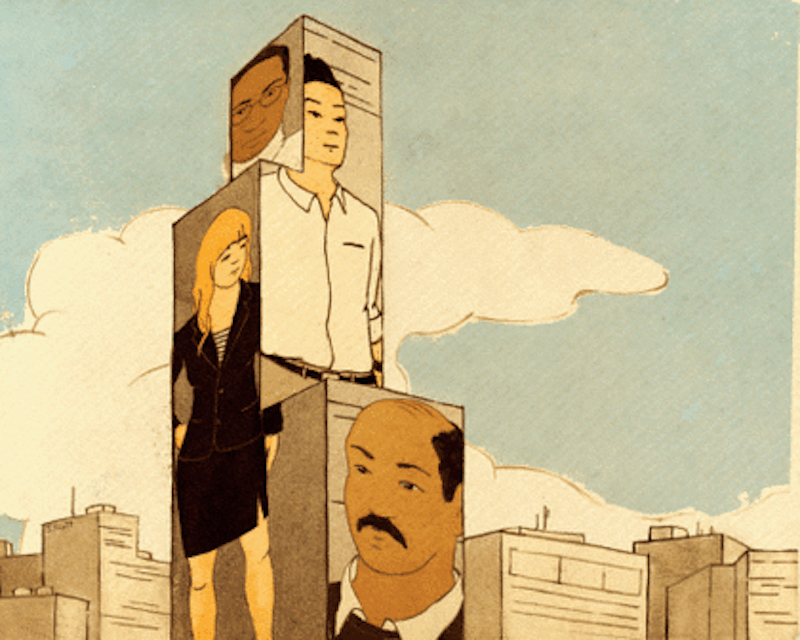Among the 20 critics at The New York Times, none are black, and only two are people of color, according to public editor Margaret Sullivan. Sullivan was responding to a Times article on Shonda Rhimes, which Sullivan (and not Sullivan alone) believes used racial stereotypes and was generally stupid and insensitive.
Sullivan's point is clear enough; to avoid such future errors, the Times should hire more black critics. And I think she's right about that. But I also admit that I had a less charitable visceral reaction. That reaction was, "Hey, I'm a critic. I'd like to write for the Times. If they start hiring only black writers, I won't have a chance! Unfair!"
This reaction is fairly ridiculous. Sullivan's point is that the Times almost always hires white critics. I'm white. All the demographic information we have about the Times critical staff suggests that people like me are disproportionately likely to be critics there. If no one comes around knocking on my email from the Times, it's not because I'm white; it's because they decided to hire different white people instead.
I'm sure the Times doesn't fill its critical staff thinking, "What white person will we hire today?" That's part of why calls for diversity can provoke resentment or anxiety in white people. The way you increase diversity is by looking for diverse people. The way you get an almost all white staff is subtler. The push for diversity can feel unfair, because, as a white person, you don't see the push for whiteness—which is actually bigger and more powerful, but for just that reason, often harder to bring into focus. You can't see a continent when you're standing in the middle of it.
I don't know why the Times has done such a crappy job of hiring black critics, but I do know in general the sorts of barriers you can encounter in trying to make a media outlet more diverse. I edit my own small, all-volunteer comics and culture website, The Hooded Utilitarian. One of my goals for HU has been to include a wide range of topics, and a wide range of writers. But even though I'm committed to having women and people of color write for the site, the majority of posts (and the majority of comments) are still written by white guys like me. Not the overwhelming majority, I hope, but still.
So, why is that? If I'm actively looking for non-white-guy writers, why still so much white-guyness?
People often get defensive when confronted with questions like that. They'll say, well, I don't have more black writers because there aren't talented black writers out there (which anyone who's looked around Twitter or the web knows is obviously false.) Or if their publication tilts towards guys, they'll say, as Comics Journal editor Gary Groth did, that they're "gender-blind," and the disparity just happened randomly. Somehow men just write the best things, and/or, somehow men just are more interested in submitting to the publication. What can you do?
At my site, though, the tilt to white guys isn't random. Rather, it's a function of a number of factors. One of them is subject matter. Lots of women read comics, but the readership for superhero comics in particular is very male. I try to cover lots of genres, not just superheroes, but I grew up reading about people in tights hitting each other, and I have a lot of nostalgia for those narratives. That affects what I write, and since I'm the main presence on the site, it also affects who reads it, and which writers feel like HU would be a good fit for them. That leads to more people writing about superheroes, and that leads to more people who want to write about superheroes, and so forth. Genre, or subject matter, can have its own logic and momentum.
As the above suggests, subject matter can also overlap in complicated ways with social networks. America has long been, and remains, a very segregated country. I think my high school in northeastern Pennsylvania had two or three black students the entire time I was there. The overwhelming majority of my social circle in college was white. I live in Hyde Park now, which is one of the more integrated neighborhoods in the country, but still, both IRL and online, it's easy to form most of your professional and personal connections with people who look like you, in one way or another. I started writing about comics at The Comics Journal; most of the critics I met and talked to were white guys. That group of critics is still important to my site in various ways, which is one of the reasons that the demographic make-up of my site is what it is.
The New York Times doesn't have these problems. Superhero comics aren't a large part of their cultural criticism. They have the resources and prestige that I don't, so they're much less reliant on personal connections for articles than I am. Still, I can see how they ended up with almost all white writers, because I can see how HU could have virtually all white guy writers if I didn't make a conscious effort to prevent that from happening.
—Follow Noah Berlatsky on Twitter: @hoodedu
Illustration by Elliott Golden

